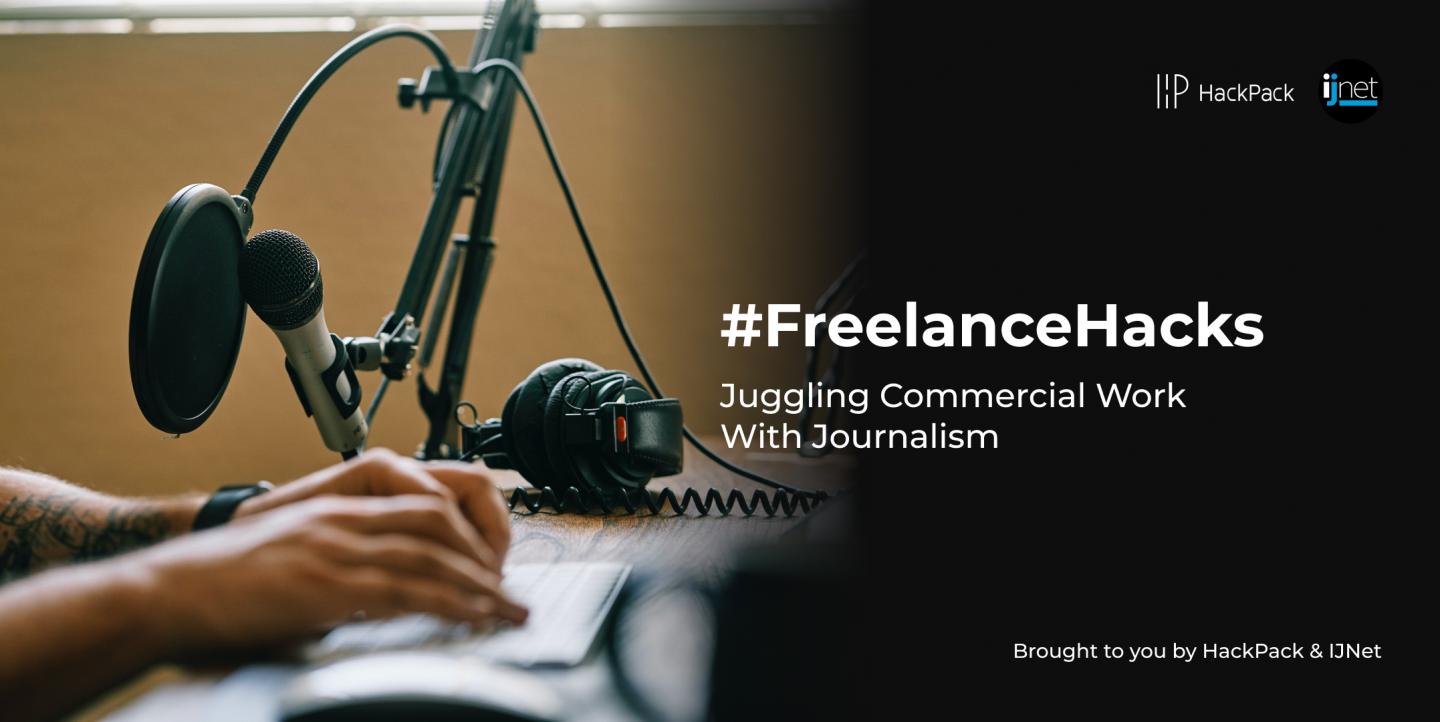There are a lot of taboos and ethical questions hanging over journalists when they ponder whether to take that corporate or commercial gig. Making things trickier, corporate clients tend to have different expectations than media outlets.
Regardless, COVID-19's impact on the market has made it a necessity to juggle between corporate projects and journalistic pieces.
To help you navigate this overwhelming sea, IJNet and HackPack teamed up to host a webinar with Marc Meier and Lauren Razavi. They shared their experiences navigating this space — from ghost writing to doing video case studies — so you better understand how to work between these two worlds.
Here are the key lessons we learned:
1) How did you tap into corporate jobs?
Lauren: Digital platforms were absolutely vital in helping me understand what the opportunities were. At the beginning, I didn’t really know what was out there, but I registered on various digital platforms and had a number of corporate clients approach me. I found that the money was good and the work was interesting and I just kind of went with it. It was an eye opener for me to put a profile up on these digital platforms and have a bunch of corporate clients come to me.
Marc: I had set my sights set on doing documentary work, but after university finances are tough, so I started looking for any type of work that involved filmmaking.
I did a few free gigs in the beginning to build a portfolio, started mingling with people and making contacts, then someone remembered me and called me back for a larger project. Everything grew organically from there.
[Read more: How do journalists find their story ideas?]
2) How do corporate jobs differ from journalistic jobs?
Marc: Journalism and the corporate world both have high expectations on quality, but I think they focus on different aspects. In visual communications for brands, image and sound have to be nearly perfect. While video journalism focuses on the story and the story takes priority over whether something was perfectly shot.
Lauren: One of the big drawbacks of corporate work is the various levels of approval that everything has to go through. A lot of stakeholders add edits into your document but do not have an editorial background or they were never given a clear understanding of what the feedback should accomplish.
So the end product isn’t always as sharp as it could be because of this editorial process. However, in media, you are working much harder and much longer and earning much less. So there are trade offs.
3) Did you feel like it was taboo to work on corporate projects?
Marc: I felt like I was a sell-out when I came right out of uni. My friends made fun of me because I created an inflammatory documentary about the corporate world in uni. In the end you just need to figure out what is best for you and how you can make ends meet. Besides I learned a lot, such as calm and positive communication skills.
Lauren: I think it is really reductive to think about things as being a sell out. If you want to be a capable creative of any kind these days, you must be a very capable entrepreneur as well. It’s important to be frank and realistic with yourself about that.
[Read more: Common mistakes journalists make when submitting pitches]
4) How do you decide which organizations to work with?
Lauren: It’s important to find a balance between fulfillment, reputation and money. Whoever I work with has to fit with my own moral compass and I have to support their mission.
5) What happens if a client pushes you to do more and more work?
Marc: Know your worth. I’m worth a specific amount of money for my time. After we go beyond that, I write them a gentle email, letting them know that we can expand beyond the original scope, but it means we will have to increase the price. Usually they will agree. Sometimes they will decide that they are happy with the existing product.
Lauren: Work is all about building relationships. If you want to keep the client, then the relationship must come first. Which means there are no blanket rules. But to avoid most problems, set out your rates clearly in advance in writing and any additional costs beyond that original scope of work. Then have the client confirm it in writing.
6) Have you dealt with conflict of interest issues?
Lauren: I think when you work with companies, it can make for better stories because you have access to more information or greater understanding so you can produce better journalism. But ethically, you are responsible for letting media editors know if there is a conflict there.
Top tips and tricks
Lauren:
Understand your piece of the puzzle, in corporate jobs, they will often provide the overall creative concept, so it’s important to understand the specific role you play and free yourself from the rest.
Be sure you have clear communication. Make sure you write everything down in an email and receive confirmation, so your role and payment is very clear.
Marc:
People prefer working with someone who is pleasant, so be responsive, friendly and accommodating
When in the editing process, don’t be too worked up because someone higher up the foodchain changes everything. Keep your cool.
Join us on Tuesday, November 17 at 11 a.m. EST for the next #FreelanceHacks — Safety in 2020 and Beyond.

